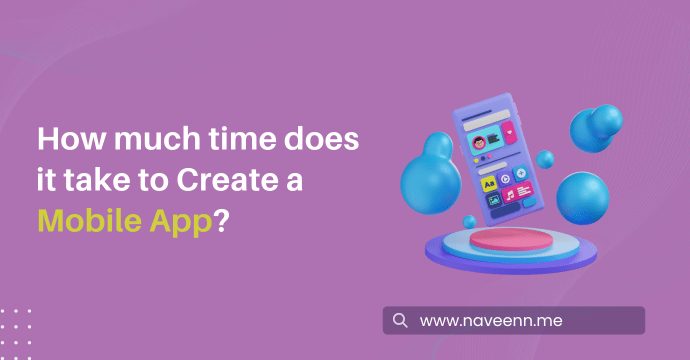When you conceive of a mobile app idea, numerous questions flood your mind, with one of the most common being ‘How long will it take to develop a mobile app?’ In an increasingly competitive market, it’s natural to seek answers to this question. We’ll guide you through estimating the time frame.
Creating a mobile app involves a series of steps that collectively contribute to the development timeline. Understanding the factors influencing the time it takes to build a mobile app is crucial for project planning and execution. In this blog post, we will explore the various stages of mobile app development and delve into the key factors that determine the overall time frame.
Influential Factors on Mobile App Development Time
The timeline for developing a mobile app can vary significantly depending on various factors. Understanding these factors is essential for accurately estimating the time required for the development process.
- Complexity of the App: Apps featuring basic functionalities and straightforward user interfaces typically have shorter development times in contrast to complex apps boasting advanced features. The overall complexity of an app is influenced by factors such as the number of features it incorporates, integration with third-party APIs, and the complexity of its backend systems. These elements collectively contribute to the overall intricacy of the app’s development process.
- Platform Compatibility: Creating an app for a single platform, like iOS or Android, generally proceeds more quickly compared to developing a cross-platform app that functions across multiple platforms. Each platform comes with its unique set of development tools, guidelines, and nuances, all of which can influence the duration of the development process.
- Design Requirements: The design phase of app development, which encompasses UI/UX design and prototyping, is pivotal in determining the total time needed for completion. Elaborate designs, customized animations, and thorough user testing can extend the design phase, thereby impacting the overall development timeline accordingly.
- Team Expertise and Resources: The proficiency and expertise of the development team can markedly influence the pace of app development. Moreover, the availability of essential resources, including developers, designers, and project managers, directly affects the project timeline. Insufficient resources may result in delays during the development phase.
- Testing and Quality Assurance: Comprehensive testing is imperative to verify the quality and functionality of the app. The duration of testing hinges on factors like the complexity of the app and the abundance of features it entails. While testing across various devices, platforms, and network conditions may extend the timeframe, it is indispensable for delivering a flawless, bug-free app.
- Client Feedback and Iterations: Client feedback and input throughout the development process can impact the timeline significantly. Employing iterative development methods, whereby the app undergoes continuous refinement based on client feedback, may prolong the development timeline. However, this iterative approach typically yields a more refined and polished final product.
Read More: Empower Future with an Innovative Mobile App Development
Strategies to Speed up the Mobile App Development Process
Efficiency is key in mobile app development, where speed often determines success. Implementing strategies to expedite the development process can lead to quicker time-to-market and improved competitiveness.
We’ll explore four effective strategies to accelerate the mobile app development process as follows:
- Prioritize Features: Recognize and prioritize the key features that provide the core functionality of the app. Concentrate on developing these features initially to establish a minimum viable product (MVP) for swift launch. By prioritizing features, development efforts can be streamlined, preventing unnecessary delays that may arise from attempting to implement all features simultaneously.
- Embrace Agile Methodology: Embracing an agile development methodology facilitates iterative and incremental progress, facilitating quicker delivery of functional software. Fragmenting the app development process into smaller, manageable tasks or user stories, prioritizing them based on business value and customer feedback, is integral.
- Leverage Cross-Platform Development: Leverage cross-platform development frameworks such as React Native, Flutter, or Xamarin to construct apps that seamlessly operate on various platforms using a single codebase. This approach minimizes development time and effort, as it eliminates the necessity to create separate codebases for each platform.
- Automate Testing and Deployment: Incorporate automated testing frameworks and CI/CD pipelines to optimize the testing and deployment procedures. Automated testing aids in the early detection of bugs and issues during the development phase, facilitating prompt resolution and enhancing overall quality. Additionally, CI/CD pipelines automate the build, testing, and deployment processes, enabling swift and consistent delivery of updates to production environments.
Conclusion
Considering the factors discussed above, it’s evident that developing a high-quality mobile app is neither swift nor simple. It demands considerable time, effort, financial investment, and strategic planning to craft an app that stands out in the competitive app market. Should you have any further inquiries about app development, do not hesitate to reach out to Alobha Technologies!

Pingback: A Complete Guide to Implement AI and ML in Your Mobile App
Pingback: What is DevOps & Its Importance in Software Development